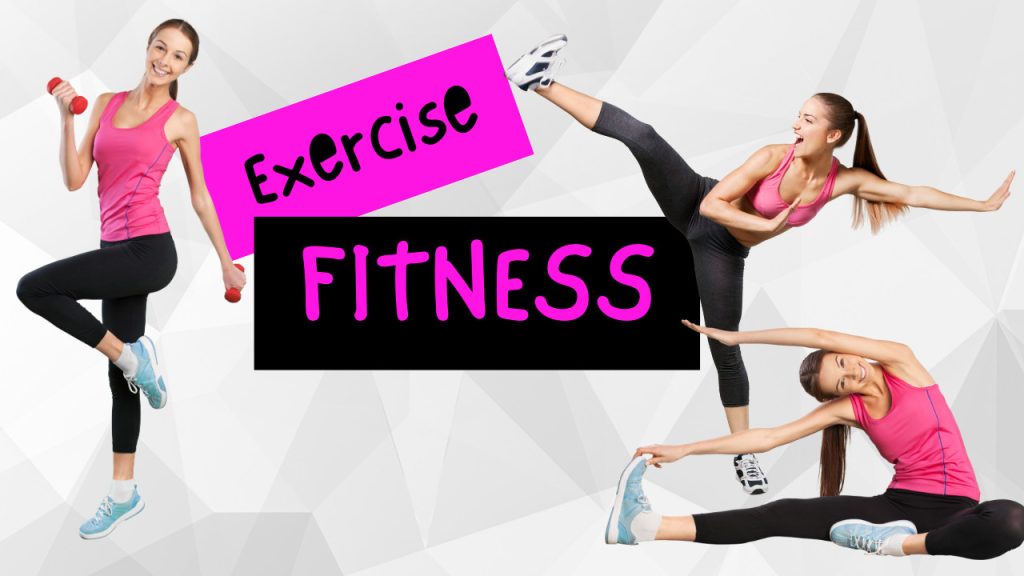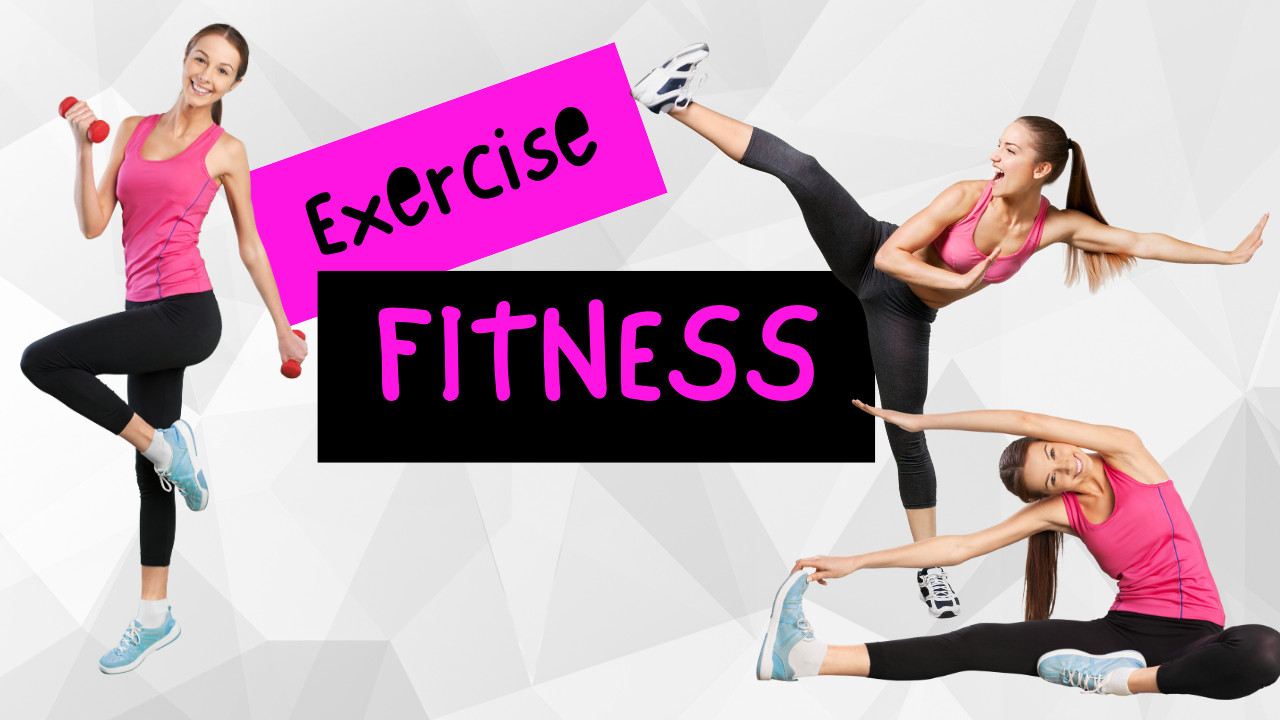
Doing exercise regularly on an everyday basis is the best thing you can do for your health. It is beneficial in various forms like managing your hunger, lifting your spirits, and helping you sleep better. Even in the longer time, it declines heart disease chances, stroke, diabetes, dementia, depression, and many types of cancer.
In this comprehensive article on Exercise & Fitness, we will move around the terms of Exercise & Fitness and will cover topics like the importance of exercise, exercise benefits, and the best types of exercise, etc.
Contents
What is Exercise?
Exercise is when you do physical activities to get your body moving, keep fit, and stay healthy. It’s also beneficial to help get body recover from an injury. People exercise for many reasons like to lose or maintain weight, some to get stronger or grow, some to build muscles or a healthier heart, some to get better at sports, some to feel healthier, and some just to perform funny activities with their bodies.
Overall, exercise is the natural key to fit the body physically not from diseases like diabetes, cancer, and heart problems, but is also the key to happiness and living a peaceful life for a whole life.
Also read: How to Lose Weight in 7 Days Without Exercise at Home
Why is exercise important?
Whether you used to be very active or never exercised, now is a great time to start working out. Exercising and making your heart beat faster and your muscles work harder helps almost every part of your body. It also makes you healthier in body and mind.
Being active is good for you in many ways. It helps keep your blood pressure in check, lowers swelling, controls your sugar levels, and makes your bones strong. It can also help you feel less sad. Also, if you exercise regularly, it can spice up your love life, help you sleep better, lower your chances of getting some types of cancer, and even help you live longer.
Experts say you should aim for at least 150 minutes of medium-level exercise every week. There are lots of specific exercises and fitness routines for adults, but it’s also important to keep moving throughout the day. You can do this by choosing to take the stairs, doing some gardening, or playing with your kids.
What is physical activity?
According to WHO, in physical activity your muscles use energy. This includes all kinds of movement, whether it’s during your free time, when you’re going places, or even when you’re working.
There are many fun ways to stay active like walking, biking, playing sports, or just playing around. Anyone can do these, no matter their age. Regular exercise is known to help prevent and control serious health problems like heart disease, stroke, diabetes, and some cancers. It also helps keep blood pressure normal, helps you stay at a healthy weight, and can make you feel happier, improve your life, and help you feel good overall.
What are the types of exercise?
As we have many exercises to do, experts usually categorize physical activity based on what your body does during each type of exercise and how each type helps you.
- Aerobic exercise is the type of workout that makes your heart beat faster. Even though it involves moving your entire body, it mainly targets your heart and lungs. When you do things like walking, swimming, dancing, or cycling with enough effort, you’ll find yourself breathing more quickly and your heart pumping harder.
- Strength training should be done 2-3 times a week. Exercises like squats, lunges, push-ups, and workouts using weights, bands, or machines help keep your muscles strong and can even make them bigger. This type of training also helps stop you from falling, keeps your bones healthy, lowers your blood sugar, and improves your balance.
- Isometric exercises, like planks and leg lifts, are done without moving. They’re really good for keeping your strength and making you more stable. Isotonic exercises require you to carry weight while you move. Things like bicep curls, bench presses, and sit-ups are all types of isotonic exercise.
- Balance exercises work on different parts of your body that help you stay standing and know where you are, like your inner ear, eyes, muscles, and joints. Tai chi and yoga are really good balance exercises that can help you not fall over and keep you able to do things on your own even when you’re older.
What are the benefits of the exercise?
Exercise is good for your mental health, and there’s a lot of research to back this up. For example, one big study found that people who don’t move around much are 44% more likely to feel down.
Another study found that people with mild to moderate sadness could feel just as good as if they were taking antidepressants by just working out for 90 minutes a week. It seems like this happens because exercise helps your brain release chemicals like serotonin and dopamine, which make you feel happier and less stressed.
When you do aerobic exercise, like running or cycling, your blood pressure goes up because your heart is pumping harder. But, once you’re done with your workout, your blood pressure falls lower than it was before you started exercising.
People believe that exercise is key to losing weight, and diet is super important too. Doing cardio, like running or swimming, is awesome for burning calories and melting fat. Any exercise that gets your heart pumping and your body moving—and that you enjoy and feel motivated to do—is the one that will help you lose weight.
- Research has shown that regular exercise can help protect against feelings of depression and anxiety. Even more, other studies have found that exercise can help manage and even treat depression symptoms. Exercise might help lower inflammation, which tends to be higher in people who are depressed.
- Regular exercise can help you sleep better. Out of 34 studies reviewed, 29 found that exercise made sleep quality better and helped people sleep longer. Exercise might help set your body’s internal clock, so you feel awake and sleepy at the right times. It might also cause changes in your brain that make sleep easier. Also, it can help reduce anxiety before bed that might otherwise keep you awake.
- Exercise is good for your brain and bones, and it helps keep your muscles strong as you get older. It can even spice up your sex life, help your digestion, and lower your chances of getting many diseases, like cancer and stroke. A study with over 116,000 adults showed that doing the suggested 150 to 300 minutes of exercise each week can lower the chance of dying from any cause by 19%.
- Exercise is good for your body and can help you manage many health problems. The Centers for Disease Control and Prevention (CDC) says that if you have conditions like osteoarthritis, high blood pressure, type 2 diabetes, multiple sclerosis, Parkinson’s disease, dementia, or if you’ve had a stroke or cancer, being active can be beneficial. Exercise can help reduce pain, improve how your body uses insulin and controls blood sugar, help you move around better, improve your heart health, lower the risk of other chronic diseases, and contribute to your mental well-being.
What to Eat Before, During, and After Exercise?
Before start your workout, especially if it’s in the morning, pay attention to whether you’re hungry or not. Jackie Dikos, a sports dietitian and author, suggests that if you had a big or late dinner the night before, you might not need to eat anything. But if you’re planning a tough workout and you’re feeling hungry, you might want to have a small snack.
During your workout, if it’s a short one, you don’t need to eat anything. But if you’re doing a long endurance workout, you should eat 30 to 60 grams of carbs every hour after the first hour. This is a suggestion from the International Society of Sports Nutrition. You could get these carbs from sports drinks.
After your workout, if you’ve done something light or moderate like a 45-minute brisk walk, you don’t need to eat right away, especially if you’re going to have a meal soon. But if you’ve done a high-intensity workout, or if you’re planning another workout later in the day or a tough one tomorrow, you’ll need to eat. Dikos suggests eating carbs equal to half your body weight in grams, adding 10 to 20 grams of protein.
Conclusion
If you’re new to working out, taking medications, or have any health issues or injuries, it’s a good idea to talk to a fitness or medical expert. Consider what your workout habits are like. If you’re the type who wants to do intense workouts every day, remember it’s okay to take a break and rest now and then.

Dr. Roman Off is a multi-talented professional with expertise in psychology, nutrition, and content writing. She has a Doctorate in Clinical Psychology and is a psychologist with several years of experience helping individuals overcome mental health issues. In addition, Dr. Roman Off is a dietitian and nutritionist, specializing in helping clients achieve optimal health through proper nutrition and lifestyle changes.

